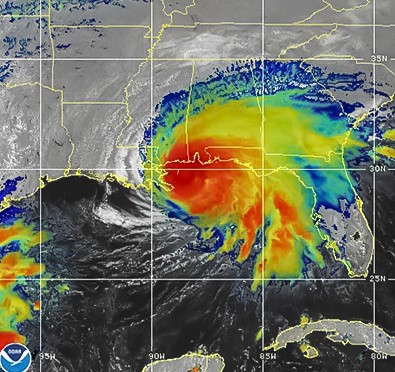By Debra Davis
South Alabama farmers are bracing for a deluge of rain from slow-churning Hurricane Sally.
Farmers along Alabama’s Gulf Coast are braced for a deluge of rain and strong winds from a slow-moving hurricane forecasters predict may dump more than a foot of rain.

The state’s cotton and pecan crops are most vulnerable, and with peak harvest still weeks away, Hurricane Sally’s imminent arrival is troubling.
“Cotton is our biggest concern right now,” said Mobile County cotton farmer Bert Driskell, who also grows peanuts, corn and turf grass. “We’ve finished our corn harvest and started digging peanuts, but we stopped when the rain started Monday.”
Although cotton harvest is a few weeks away, wind and rain can cause problems for the unopened bolls.
“Our cotton is still in the boll stage, but strong winds can bruise bolls to the point where they won’t open,” said Jeremy Sessions, who farms near Driskell in Grand Bay. “Strong wind also tangles the plants so you can’t defoliate them or see the rows to pick. If the cotton was already open, it would be worse.”
Sessions’ farm has 330 acres of cotton and is about four miles from the coast. He said even hundreds of miles inland, storms can blow cotton out of its boll, and excess rain diminishes quality.
A good pecan crop predicted by Sessions and others also appears to be in jeopardy. Harvest is a few weeks away on Sessions’ 250 acres of pecan trees. Those trees still have most of their leaves, making them more susceptible to wind.
“We were looking at the best pecan crop we’ve had in probably 15 years,” Sessions said. “The trees are loaded with nuts. I’m not very optimistic about it if the storm produces as much wind and rain as they say.”
Although peanuts are aren’t as susceptible to wind, heavy rain can wreak havoc on crops close to harvest.
“We were supposed to start digging peanuts this week, but we’re holding off until after the storm and things dry out,” said Sessions, whose family has 700 acres of peanuts. “We applied additional crop protection products to fight fungi that can damage the vines. We have to protect the vines because, if they die, peanuts fall off the roots when we try to dig them.”
Click here to see more...